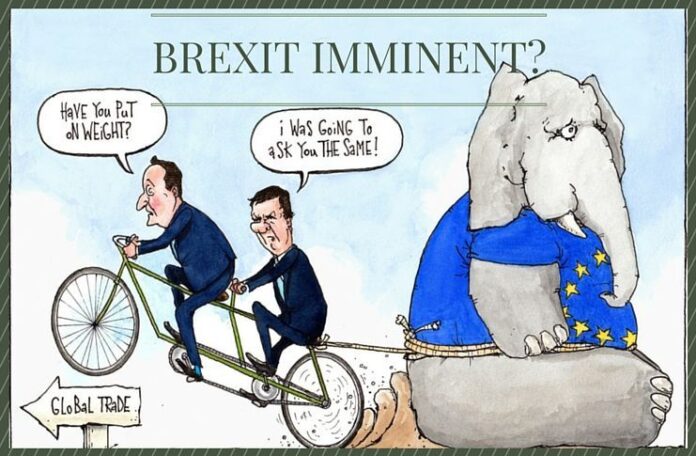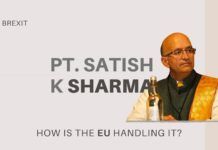
BREXIT – Does Britain prefer its Commonwealth partners over EU?
This is the concluding part in a two part series on BREXIT. For the first part, click here.
[dropcap color=”#008040″ boxed=”yes” boxed_radius=”8px” class=”” id=””]F[/dropcap]ree movement of labor and goods is an admirable objective, but in a Common Market labor from poorer countries will most certainly gravitate to richer ones in large numbers to benefit from their employment benefits. Britain thus finds itself burdened with a huge net migration of 323K, mainly from impoverished Romania and Bulgaria.5 This is one of the many reasons that BREXIT is being contemplated.
The British euro-sceptics, therefore, would like to restrict their relationship with the continent, by making it strictly commercial, though even then, Britain would be subject to EU laws.
When a disinterested critic looks at the BREXIT issue, the feeling obtained is that it is a yesteryear problem. Since the US has a free trade agreement with the EU, negotiations for an integrated market should include NAFTA countries and an expanded EU, which would include Bosnia. The EU, with Britain in, is a geographical unit, which is already a Superpower. This geographical, economic, and defense unit that the EU embraces is best able to deal with dangers from the east, like the threat of IS and the alleged threat from Russia. The sovereignty advantage that Britain treasured is history. In fact, Britain has already made, and can make, significant changes within the evolving EU: Britain has become a middling contributor to the budget, reduced wasteful expenditure for agriculture, and liberalized the economy for the benefit of all its members. The key members of the 28-member bloc, France and Germany, do not want Britain to leave. The euro-sceptics seemed to have overplayed the sovereignty card.
[dropcap color=”#008040″ boxed=”yes” boxed_radius=”8px” class=”” id=””]F[/dropcap]rance’s Charles de Gaulle detected Britain’s “deep-seated hostility to (centrist) EU” and kept Britain out. Britain had to apply three times from 1963 to 1969, and only at the third attempt, when de Gaulle lost power, was Britain accepted. Both Conservatives and Labour wanted to join the EU before the seventies as it was thought that France and Germany were forging ahead of Britain, economically. Even before the first referendum of 1975 most British voters were in favour of remaining out of Europe, but Vernon Coleman, 6 a medical doctor and novelist, said that PMs Harold Wilson and Edward Heath spent £10 million to trick the populace into believing that joining the EU would benefit Britain enormously. The Prime Ministers were probably right, but what was important at the time was that 67% voted to join the EU. In the Commons, only 39 Tories voted out.
Despite there being more vociferous euro-sceptics today than there were in 1975, Cameron is likely to win the referendum vote. The method is likely to be the same as it was in 1975. Cameron has been “talking silk”: Marina Wheeler wife of Cameron’s rival London mayor Boris Johnson, and Justine Thornton wife of former Labour Party leader from 2010 to 2015 Ed Miliband were made Queen’s Counsel.7 These timely appointments should bring Cameron support from the Labour Party and the capital’s mayoral parlour.
Cameron is bound to be supported by the press for sound reasons. Industry Director Alan Tovey notes that two business organisations, the Institute of Directors and manufacturers’ trade body, EEF, were against being out of the EU; 60% were for “in.” As soon Boris Johnson declared his support for BREXIT the value of the £ hit a seven-year low, to $1.3879. The Hong Kong Bank of Canada (HSBC), Britain’s largest bank, said that it would lose £13.9 billion a year and 75,000 jobs in London by 2030 if Britain left the EU; it was prepared to make Paris its administrative centre.8 Hazel Sheffield9 argues that workers’ rights are at stake if Britain leaves the EU. Britain, for instance, benefits from EU labour laws which outlaws discrimination based on sex, pregnancy, maternity, race, religion, sexual orientation or gender requirement. Cameron also felt that Dover would replace Calais for non-European migrants, if Britain left the EU. According to the British head of Europol, 5000 jihadists have slipped back into Europe after training in the Middle East, which means that Britain would not have to fight alone.
[dropcap color=”#008040″ boxed=”yes” boxed_radius=”8px” class=”” id=””]B[/dropcap]ritish Justice Secretary Michael Gove10 was right in contradicting Cameron by saying that Cameron’s deal was not legally binding. Gove, himself a staunch Cameron supporter, received much criticism, wrongly, for saying that Cameron’s deal had not been passed by the EU’s parliament. It was a gentleman’s agreement that the EU would accept. The Czech representative made a similar comment as Gove in the EU parliament.11
Brexit supporters cannot deny the fact that in 2014, over half of British exports went to the EU; the figure for 2015 is slightly lower, but it will rise as the poorer parts of the EU get richer, as Austria did after World War II. The EU market is a plus for Cameron, as being out would lead to more regulations and less profit.
Often, it is difficult to interpret what is going on in the shadows. Is Nicola Sturgeon’s recent cry for Scottish independence a contrived strategy by Cameron? Or is it a genuine warning that Sturgeon wants to be out of the UK, but in the EU?
Generally smaller states want to be in the EU: dozens of polls show that 55% of the Welsh, 64% of the Scots, and 75% of those in Ulster want to remain in the EU. This means that Britain is in danger of being fractured and that the English vote needs just 40% for an absolute majority to stay in the EU, notes Professor Richard Rose. These stats are in Cameron’s favour.12
[dropcap color=”#008040″ boxed=”yes” boxed_radius=”8px” class=”” id=””]I[/dropcap]f the methods of the first referendum are to be followed, Cameron will have to arm the press with his views, until June 23, 2016. In the meantime, Lithuanian President Dalia Grybauskai thinks all these policy strategies amount to British drama; Cameron has to make it look like he has negotiated a difficult deal.13
By and large, the Continent is quite resolved to the British dilemma. Some feel that Britain can leave the EU if it wants to, but a neutral observer would wonder why Britain would want to leave the largest Superpower on the planet? Most European countries look at BREXIT from their own perspective and want to study how individual clauses affect their countries before Parliament passes them.
The European parliament seems to be quite accommodating. Take the issue of currencies. Britain wanted the EU to acknowledge that different currencies would be accepted. The EU did that without “mandating multiple currencies.” It merely altered one sentence by changing the financial regulations by one sentence: “The single rule book is to be applied to all credit and financial institutions in order to ensure a level playing field within the internal market.”14
[dropcap color=”#008040″ boxed=”yes” boxed_radius=”8px” class=”” id=””]S[/dropcap]hould there be a hitch in future negotiations, Britain has several models before it. EFTA countries did not join the EU; Norway, Iceland and Liechtenstein are examples of this model. But these are not major economic powers. Another model is Switzerland which has 20 major and 100 minor bilateral agreements with the EU. Or Britain, like Turkey, could have just a customs union with the EU. Alternatively, Britain could access the EU through World Trade Organisation rules.
Should Cameron need a little boost, it might be worth pointing out that America prefers Britain in than out of the EU.
References
-
Thomas Burrows, “June 23 could be the UK’s Independence Day says Nigel Farage…EU,” dailymail.co.uk, February 27, 2016.
-
Douglas Murray, “The EU ‘deal’ is a political stick-up,” spectator.co.uk, February 21, 2016.
-
Michael Wilkinson, “EU referendum…clash,” telegraph.co.uk, February 22, 2016.
-
Simon Walters & Glen Owen, “Revolt of the EU rebels…” dailymail.co.uk, February 20, 2016.
-
Tim Scunthorpe, “Migration from Romania and Bulgaria drive net migration up by 31K,” dailymail.co.uk, February 25, 2016.
-
Vernon Coleman, “How the British media lied and tricked us into joining the EU,”vernoncoleman.com, 2000.
-
Brendon O’Neill, “From Trumpmania to Euroscepticism: Revenge of the plebs,” spectator.com, February 23, 2016.
-
Wilkinson, op.cit.
-
Hazel Sheffield, “The workers’ rights are at stake if Britain leaves the EU,” theindependent.co.uk, quoted in timesofindia.indiatimes.com, February 22, 2016.
-
Tim Scunthorpe, “Michael Gove should be fired …” dailymail.co.uk, February 25, 2016.
-
Nigel Jones, “Who are these contemptible hypocrites trying to block Cameron’s EU deal?” telegraph.co.uk, February 18, 2016.
-
Richard Rose, “Will the EU referendum trigger the break-up of the UK?” dailymail.co.uk, February 21, 2016; also see Mark Duell, “Nicola Sturgeon says vote to leave EU will ‘almost certainly’ trigger a new independence referendum in Scotland,” dailymail.co.uk, February 21, 2016.
-
“David Cameron secures EU deal, but cabinet colleague (Gove) set to abandon PM,” telegraph.co.uk and washingtonpost.com.
-
Brendon O’Neill, op. cit.
- Part2 – China’s Road to Superpower status - July 20, 2017
- Part1 – China’s Road to Superpower status - July 18, 2017
- P2 – Can or should Qatar be ostracised? - June 29, 2017











Well you certainly got that wrong, didn’t you. Any other important tips you’re gestating that I shouldn’t listen to either?